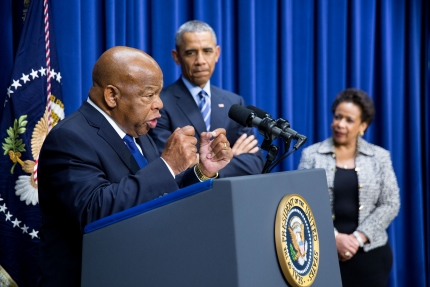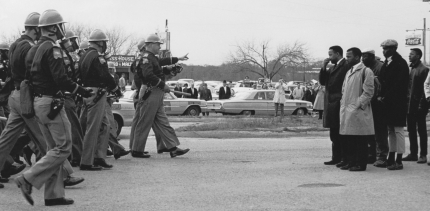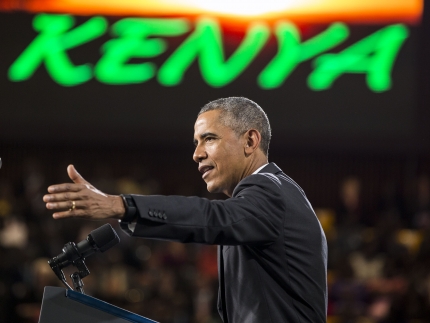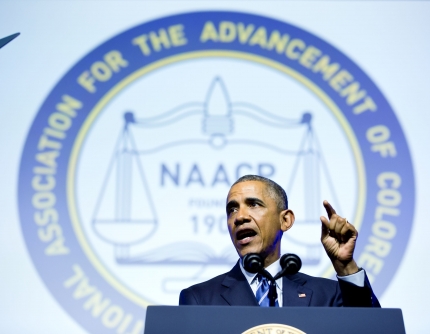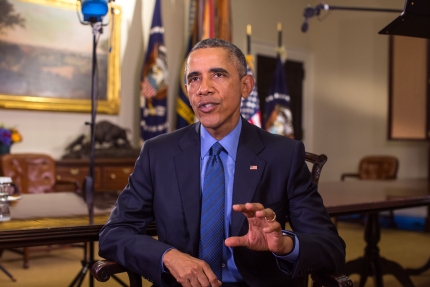Blog Posts Related to the African American Community
President Obama, Congressman John Lewis, and Others Mark the 50th Anniversary of the Voting Rights Act
Posted by on August 6, 2015 at 5:29 PM ESTFifty years ago, on August 6, 1965, President Lyndon Johnson signed the Voting Rights Act into law — a landmark piece of legislation breaking down barriers across the South that prevented countless African Americans from voting.
This afternoon, President Obama hosted a discussion here at the White House to mark the Act's 50th anniversary, featuring Congressman John Lewis, Attorney General Loretta Lynch, MSNBC's Melissa Harris-Perry, and others.
Learn more about Civil Rights50 Years After the Voting Rights Act, We Still Have Work to Do
Posted by on August 6, 2015 at 9:00 AM ESTEd. note: This is cross-posted on Medium.
The right to vote is one of the most fundamental rights of any democracy.
Fifty years ago today, because of the sacrifice of countless men and women, that right was secured for more Americans.
On August 6, 1965, President Lyndon Johnson signed the Voting Rights Act into law — breaking down legal barriers at the state and local level that had prevented African Americans and others from exercising their constitutional right to vote.
Because of that law — one of our nation's most influential pieces of legislation — Americans who were previously disenfranchised and left out of the democratic process were finally able to cast a ballot. The law was designed to ensure that all American citizens, regardless of the color of their skin, had an equal opportunity to make their voices heard.
But that law didn’t come to pass because folks suddenly decided it was the right thing to do.
This past March, I had the honor of traveling to Selma, Alabama for the 50th anniversary of the “Bloody Sunday” march from Selma to Montgomery. Those who marched over the course of those five days in 1965 were fighting to ensure that African Americans could exercise their right to vote under the 15th Amendment of our Constitution. They were marching in the face of a segregationist system that wanted to deny them that right.
And on one afternoon, two visions of America met on the Edmund Pettus Bridge. Those nonviolent marchers, representing the idea that all men and women are created equal and deserved to be treated as such, stared into the faces of those who represented a South that stood for the racial segregation and oppression of Jim Crow.
Roughly 600 people stood on the right side of history that day — armed only with their faith, and the conviction that we could be better. They were willing to sacrifice their own bodies in order to help bring America closer to its ideals of equality and justice for all.
Learn more about Civil RightsPresident Obama Travels to Kenya and Ethiopia
Posted by on July 26, 2015 at 5:04 PM ESTProud to be the first American President to visit Kenya. Happy to see family, and to talk with young Kenyans about the future.
— President Obama (@POTUS) July 24, 2015
This week President Obama is traveling in Kenya and Ethiopia to attend the 2015 Global Entrepreneurship Summit and to meet with leaders from government, business, and civil society. The trip is reinforcing the U.S. commitment to expanding economic growth and trade, strengthening democracy on a global scale, and investing in the next generation of African leaders.
Follow along for highlights from the President's trip.
Learn more about , , , Foreign PolicyWhat I Learned from Demond:
Posted by on July 22, 2015 at 2:29 PM ESTThis afternoon, Denice W. Ross, a Presidential Innovation Fellow, sent the following message to the White House email list. She introduces readers to Demond Fortenberry, a 14-year-old resident of New Orleans who participated in a local coding event last week, where the City of New Orleans previewed four data sets related to policing.
Keep reading to learn more about the event -- and if you didn't get the email, sign up for email updates here.
Last week, at a coding event in New Orleans, 14-year-old Demond Fortenberry blew me away with his data-savvy and curiosity.
At the event, hosted by local nonprofit Operation Spark, the City of New Orleans previewed four policing-related data sets. As the password for viewing the data came up on the screen, I reflexively cracked open my laptop to dive in -- but fortunately, I had the good sense to close it back up. This time, I wanted to experience the unveiling of a new data set from the perspective of a young coder.
And I'm glad I did.
I was a little nervous at first about whether this never-before-seen data would catch the attention of Demond and the other young coders. But watching Demond work with the data -- and build a collaborative working relationship with city leadership in the process -- removed any of those fears.
From incident locations to readouts on the demographics, he recognized what was happening in his community, and he started to ask questions.
Read the full story here, and pass it on -- and then find out how you can get involved.
Demond Fortenberry and City of New Orleans CIO Lamar Gardere review police data together with other hackathon participants.
President Obama: "Our Criminal Justice System Isn't as Smart as It Should Be"
Posted by on July 15, 2015 at 12:12 PM ESTYesterday, the President traveled to Philadelphia to address the NAACP's 106th national convention. In his remarks, he laid out the reasons why we need to reform America's criminal justice system, and why we need to invest in our communities and expand opportunity for all Americans.
Weekly Address: Making Our Communities Stronger Through Fair Housing
Posted by on July 11, 2015 at 5:00 AM ESTIn this week's address, the President discussed a new rule announced by his Administration earlier this week to make it easier for communities to implement the Fair Housing Act.
For nearly 50 years, the Fair Housing Act has prohibited landlords from turning away tenants because of race, religion, sex, national origin, or disability, and has made a big difference in this country. This week, the Administration announced new steps to provide communities with the tools they need to ensure that housing is fair, and that no American’s destiny is determined by a zip code.
Transcript | mp4 | mp3
Learn more about
